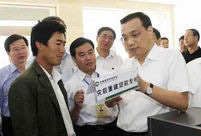 PLA aerobatic team arrives in Russia for air show
PLA aerobatic team arrives in Russia for air show
 Enjoy your time in Maldives
Enjoy your time in Maldives
 Tranquil scenery of Baiku Co Lake in Tibet
Tranquil scenery of Baiku Co Lake in Tibet
 Indian-controlled Kashmir celebrates Independence Day
Indian-controlled Kashmir celebrates Independence Day
 Lady of mystery: Female SWAT team in prison disclosed
Lady of mystery: Female SWAT team in prison disclosed  Art-like scenery of Zoige
Art-like scenery of Zoige
 How do North Koreans stay cool in summer?
How do North Koreans stay cool in summer?
 Reservoirs in S China start to release floods
Reservoirs in S China start to release floods
 Top 10 naked hotels in the world
Top 10 naked hotels in the world
China's interest rate reforms entered a new stage as central bank governor Zhou Xiaochuan said that the country is ready to free deposit interest rates.
Zhou said during an interview on Monday that reform is under way as planned, without specifying any schedule. He is personally optimistic, which was seen as an official signal to continue the reform after last month's first step.
The People's Bank of China (PBOC) announced a key move on July 19 to liberalize bank lending rates. The floor limit for lending interest rates will be canceled and financial institutions can decide their own rates following commercial principles, according to a PBOC statement.
Controls on bill discount rates will be scrapped and the ceiling limit for lending from rural banks will be eliminated. Lending rates for personal homes will be retained to ensure healthy growth of the property market.
Lu Zhengwei, chief economist with Industrial Bank, said canceling the floor for lending rates is a remarkable step in the reform, and the pricing of deposit rates shall now be under the control of financial institutions.
Reform of state-owned enterprises needs to be deepened to build a fairer environment for private businesses to benefit from lower lending rates, Lu added.
Ba Shusong, a researcher from the Development Research Center of the State Council, said the interest rate reform will have a long-term effect on the commercial banking system, and differentiate specific service targets for large and small banks.
The reform will cut costs for business financing, provided that the threshold becomes lower and government realizes better controls of potential risks, Ba added.
Deposit insurance programs are crucial to cushioning the shock of reform in the banking system, considering issues that arose during similar reforms in the U.S. and other Asian countries.
In June, the PBOC said the long-awaited deposit insurance system is ready to be launched to increase flexibility of commercial banks in terms of financial innovation and risk control.
Deposit insurance programs protect bank depositors by guaranteeing that a certain level of deposits will be repaid, even if a commercial bank goes bankrupt and cannot pay them.
The Chinese government is determined to regenerate its outdated economic system, with marketization of interest rates high on the reform agenda. In June and July of 2012, the central bank widened the floating bands for lending and deposit rates.
In the second quarter of 2013, the Chinese economy grew 7.5 percent year on year, slowing from 7.7 percent in the first quarter, as the government deliberately cooled down the growth in exchange for space for rebalancing the economy,allowing a more sustainable expansion.
 Premier Li: We rely on farmers for a living
Premier Li: We rely on farmers for a living Top 10 Chinese provinces for the well-heeled
Top 10 Chinese provinces for the well-heeled  Fan Bingbing poses for Malaysian magazine Citta Bella
Fan Bingbing poses for Malaysian magazine Citta Bella Enjoy your time in Maldives
Enjoy your time in Maldives Wild dream: Hell-like training for bodyguard
Wild dream: Hell-like training for bodyguard  Zhang Xinyi covers COSMOPOLITAN
Zhang Xinyi covers COSMOPOLITAN China’s weekly story
China’s weekly story  The story of a savior sibling
The story of a savior sibling A collection of bizarre rooftop buildings around China
A collection of bizarre rooftop buildings around China Chinese naval escort taskforce conducts live-fire training
Chinese naval escort taskforce conducts live-fire training Maldives - the best destination for snorkeling
Maldives - the best destination for snorkeling Group wedding ceremony in Xinjiang
Group wedding ceremony in Xinjiang The world's biggest pure gold mascot
The world's biggest pure gold mascot Those embarrassing copycat buildings
Those embarrassing copycat buildings Weekly Sports Photos
Weekly Sports PhotosDay|Week|Month